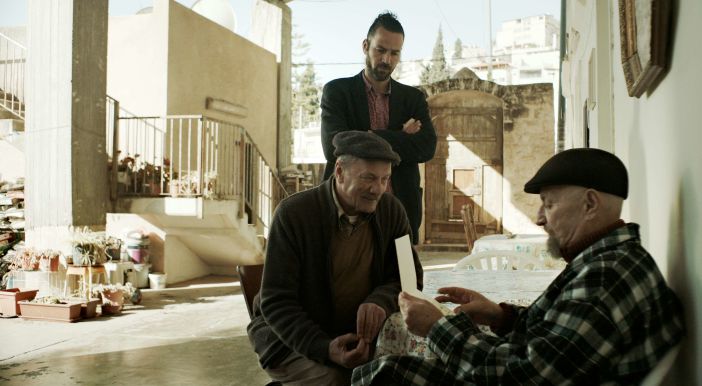Wajib (Duty)

This is expert filmmaking from Annemarie Jacir, now a veteran of the art house festival circuit. A story of fathers and sons, East and West, progression and conservation, Wajib intelligently explores the tensions within an Arab family living in contemporary Israel. Politics is always there, of course, but through a peculiar road trip – one confined to the labyrinthine streets of Nazareth, the city with the highest Arab population in Israel – we observe a fraught personal relationship simmer and boil. We’re never far away from the pot tipping over.
Abu Shadi (Mohammed Bakri) needs to deliver his daughter’s wedding invitations, as is custom. He solicits the help of his son Shadi (Saleh Bakri – yes, the paternal relationship is not just for show), who has temporarily returned from Rome where he is an aspiring architect. Sporting a bun and a pink shirt, Shadi invokes light mockery from his father. Still smoking after a recent heart attack, Abu Shadi receives light disdain from his son. Their respective barbs cloak deeper ill feeling, a sense of incompatibility. We learn that the mother ran off with another man to America. Shadi is still in contact and shows clear affinity to her sense of adventure and self-respect. He abhors his father’s toadying to Israelis for a teaching promotion, seeing superiority in his own flight to more open-minded climes. (We learn his departure wasn’t so simply initiated.) Alternatively, his sister Amal (Maria Zreik) sees the virtue of her father’s constant support. The possibility of the mother’s return for the wedding, which hinges on the health of her new husband, hangs over the endless deliveries and preparations.
Jacir’s achievement is that these characters do not descend into caricature. Abu Shadi’s conservatism and respect for tradition is balanced by a pragmatic, refreshing approach to others. He commits small dishonesties constantly, not out of malice or even cowardice, but out of an understanding that assuaging people’s fears and comforting their egos is a fundamentally human attribute, a necessary aspect of friendship. Shadi, conversely, is hot-headed and frustratingly obstinate. His politics of progressive nationalism have no pliability, no thoughtfulness. Yet, he is the character with whom we most sympathise, his ideas about architecture and aesthetics delivered pompously but nevertheless with intellectual ballast. The film wishes to show the reconciliation of distinct beliefs – these men love each other, know each other – and so we conclude on something crucial: the pleasure of giving respect.
Joseph Owen
Wajib (Duty) is released in select cinemas on 14th September 2018.
Watch the trailer for Wajib (Duty) here:

























Facebook
Twitter
Instagram
YouTube
RSS